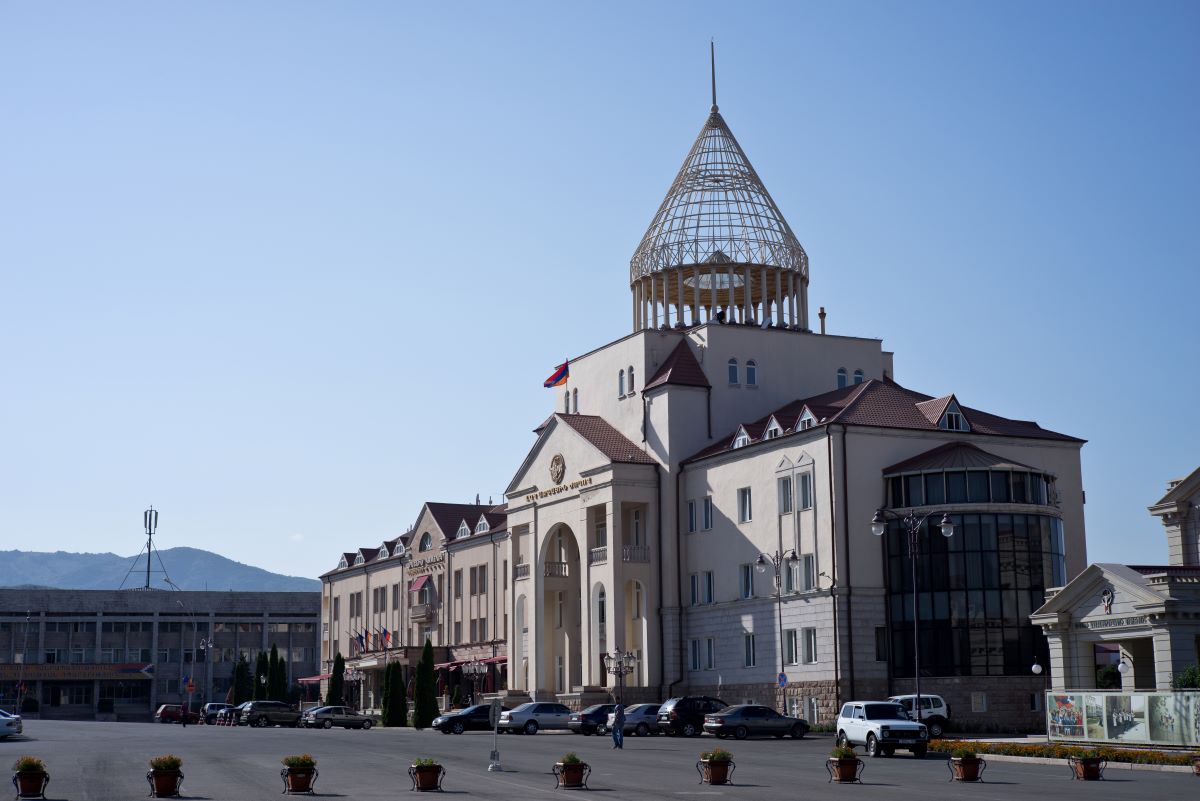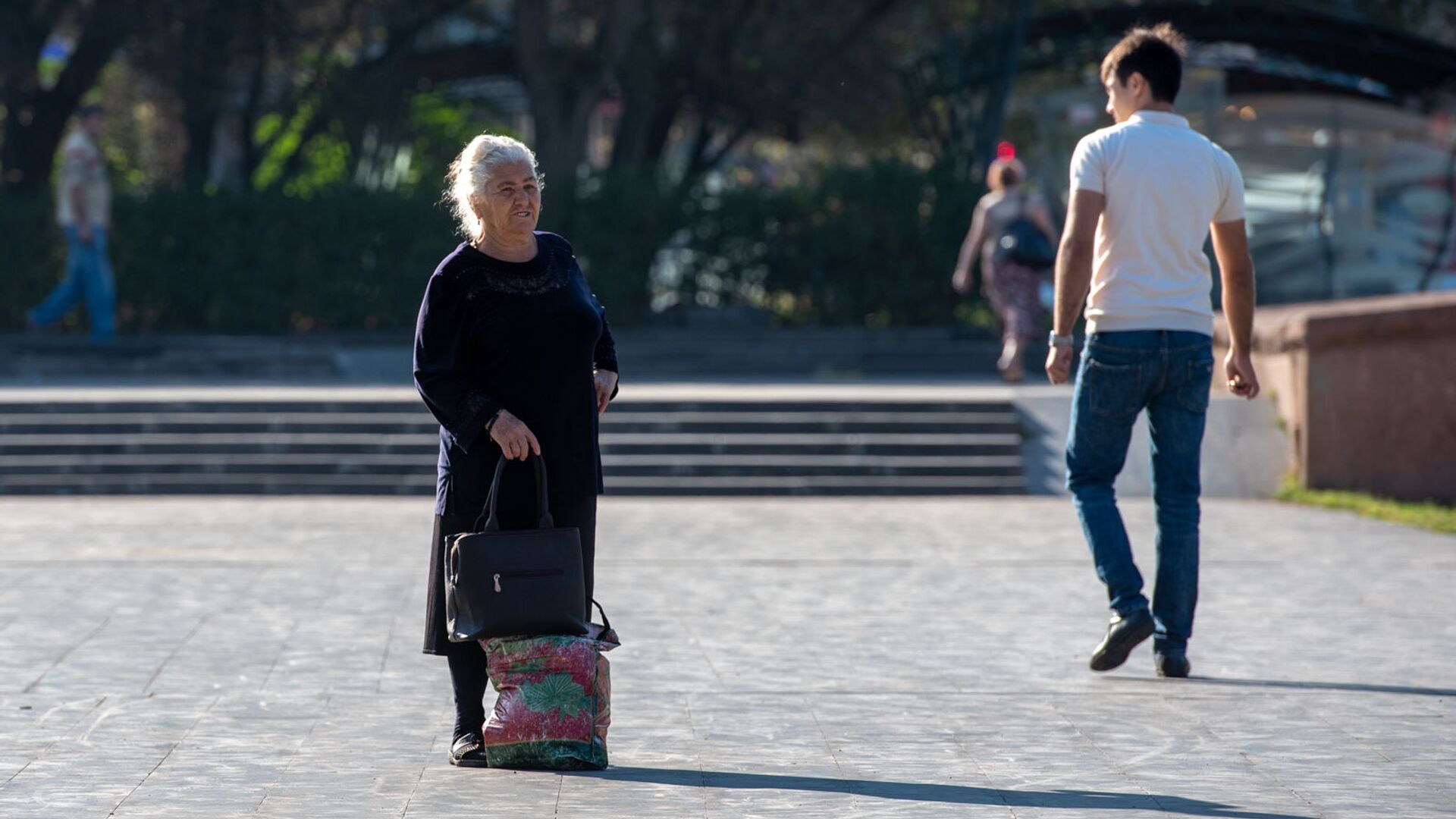"We need to integrate into a new market": NK residents in business in Armenia
NK residents in business
Armenia’s labor market has always been small, but recently the demand for vacancies has increased due to the large-scale influx of Russians and citizens of India into the country. And since September last year, more than 100 thousand residents of Nagorno-Karabakh have joined them. If those who moved from Russia are mostly provided with jobs, the rest have to be satisfied with offers on the local labor market.
As for Karabakh Armenians, the Armenian government launched various employment programs for them immediately after their mass migration. According to the Ministry of Labor and Social Affairs, as of December 2023, 5,351 people have been employed in the fields of manufacturing, education, services and construction. 180 medical workers from NK have started working in various clinics in Yerevan. Another 1,608 people received employment referrals from the Unified Social Service.
Last week the government approved the implementation of a new program for NK refugees. Now they will be able to get additional professional training to get a job in Armenia.
But there are also those who are trying to start their own businesses to support their families. Stories of budding entrepreneurs.
- Employment programs in Armenia for refugees from Nagorno-Karabakh
- How Armenia solves the problems of the Karabakh people: are the government’s projects effective?
- Students who moved to Armenia from NK to receive tuition fee reimbursement
“That’s the girl who bakes flatbreads”
The smell of Karabakh flatbread with herbs, called zhingyalov hats, literally lures passersby into a small room labeled “The Spirit of Artsakh in Echmiadzin”. From the window, you can see a young woman rolling out the dough and covering it with herbs with deft finger movements.
“Cilantro, dill, mint, nettles, spinach, green onions, sorrel…,” Gayane says. “Armenia has all the necessary herbs. I don’t have ready-made flatbread. I bake them when they are ordered, to serve them hot.”
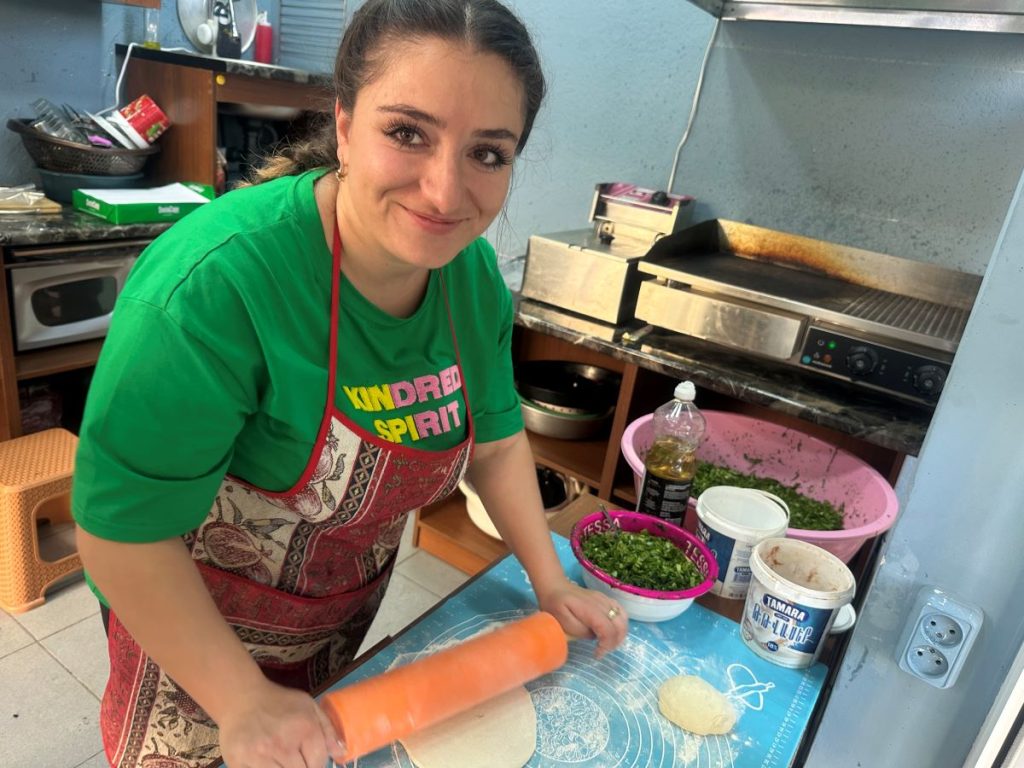
Gayane Petrosyan, 27, is a mother of two children. After moving to Armenia, she settled with her family in the city of Echmiadzin.
“I am very good at baking flatbread with herbs. Making them is a ritual, the meaning of which is to gather the whole family. Every weekend my grandmother used to bake zhengyalov ats in our village, Berkadzor, and we would all gather at her place.”
Gayane’s business started with discussions on social networks. She realized that there was a demand and started taking orders. And she is proud that she is already recognized in the city:
“When we meet, people say: ‘This is the girl who bakes flatbreads. The most customers are in the afternoon. If I get more orders, I will rent a bigger place to sit with my family and friends. I started the business with small steps, for bolder steps I need to get stronger.
We live in a two-room apartment with ten people. How can we not work? My husband also works, he is in agriculture. We left everything in Karabakh, we left without belongings – in what we were wearing. I don’t expect help from anyone. Let them help those with many children, those who have problems. I will earn my own money and raise my children.”
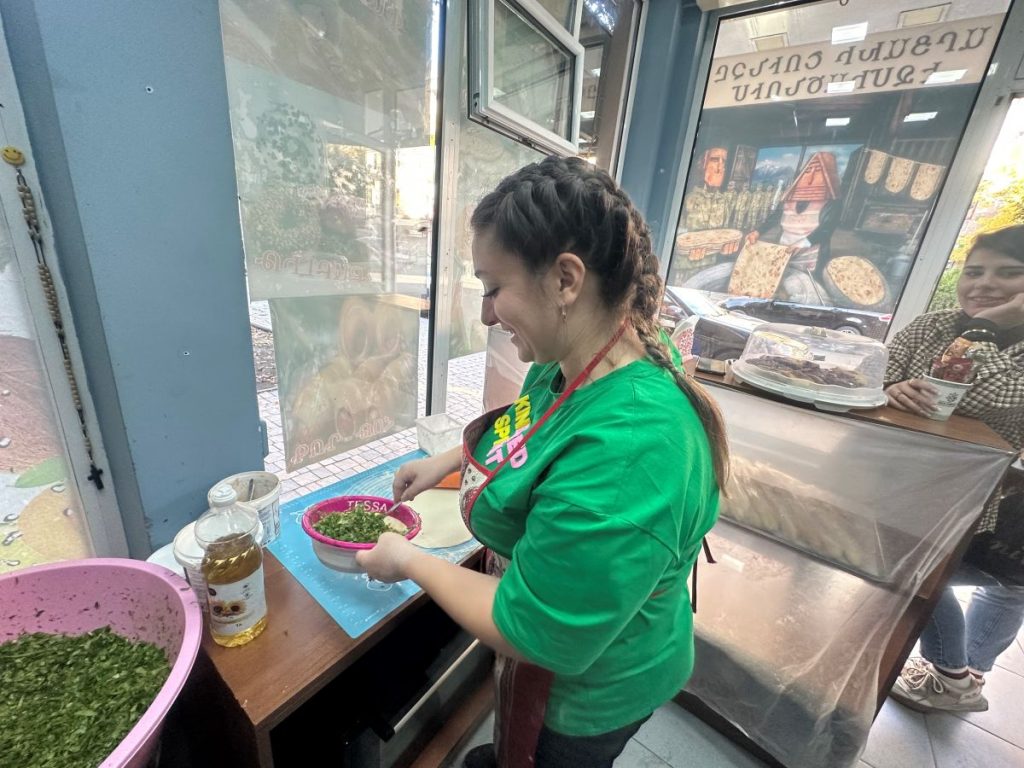
In the corner of the small bakery is a wooden symbol of NK’s We Are Our Mountains, which she affectionately calls “Dedo-babo” (grandparents).
“There are only memories left. Wherever I go, I carry it with me. When we left, all we thought about was surviving, getting the children to safety. After a few weeks, we realized that we had left a part of ourselves behind in our homeland. This pain is slowly getting worse. I try to hold on, but it is not easy.”
How a biology teacher became a chef
On the day of her departure from NK, Shogher Yesayan put a mixer in her bag with her children’s clothes at the last moment. She says she never imagined at the time that it would become her professional tool:
“I never imagined that I would be able to sell what I cook and earn money from it. I’ve always loved cooking and serving, but I’ve never sold. Now that our lives have changed, I have to treat it like a job.”
She is 37 years old and has three children. She is now settled in the city of Dilijan with her family.
“The forests of Dilijan, these fall landscapes take me every moment to Norshen, where I come from. I think we will stay here. We liked the city, the people. Plus, it’s a tourist center. Maybe I can tap into the local market with my cooking skills. My husband was hired as a military teacher at the school, but I was not, there was no place for a biologist at the local school,” she says.
For tourists who prefer home-cooked meals, Shogher and her family welcome them in the apartment where they now live. Shogher posts information about the business on social media.
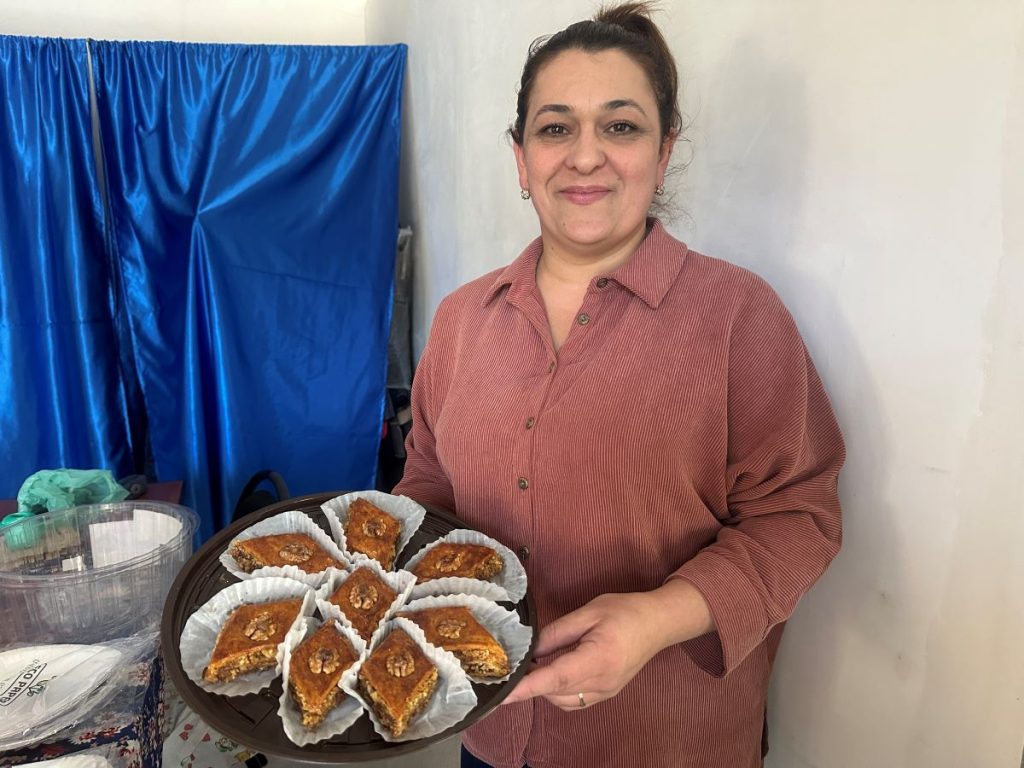
“I started working about two months ago. We had tourists from India, Russia. I cook typical Armenian and especially Artsakh dishes and sweets. Everyone likes baklava very much. I think my business should be called “Baklava”. I hope for success.”
New market – different rules of the game
Srbuhi Vanyan is a journalist who worked at the Public Radio of NK. Already in Yerevan, she has started working at the Public Radio of Armenia. Despite the tragic nature of the move, it was only after the move that Srbuhi’s family was reunited. Her husband left Karabakh on business on December 11, 2022, the day before the blockade of the Lachin corridor, and was never able to return home.
Srbuhi and her two daughters were forced to leave their apartment as soon as the September hostilities began.
“We were not allowed to return, the area was under the gun. Leaving home, I didn’t take anything. But when we were already leaving Artsakh, my father, brother and I secretly went up to my apartment at night to take the thermopress. I gave it to my friends who were going to Yerevan by car. I couldn’t bring it myself – we were going to arrive by bus,” she says.
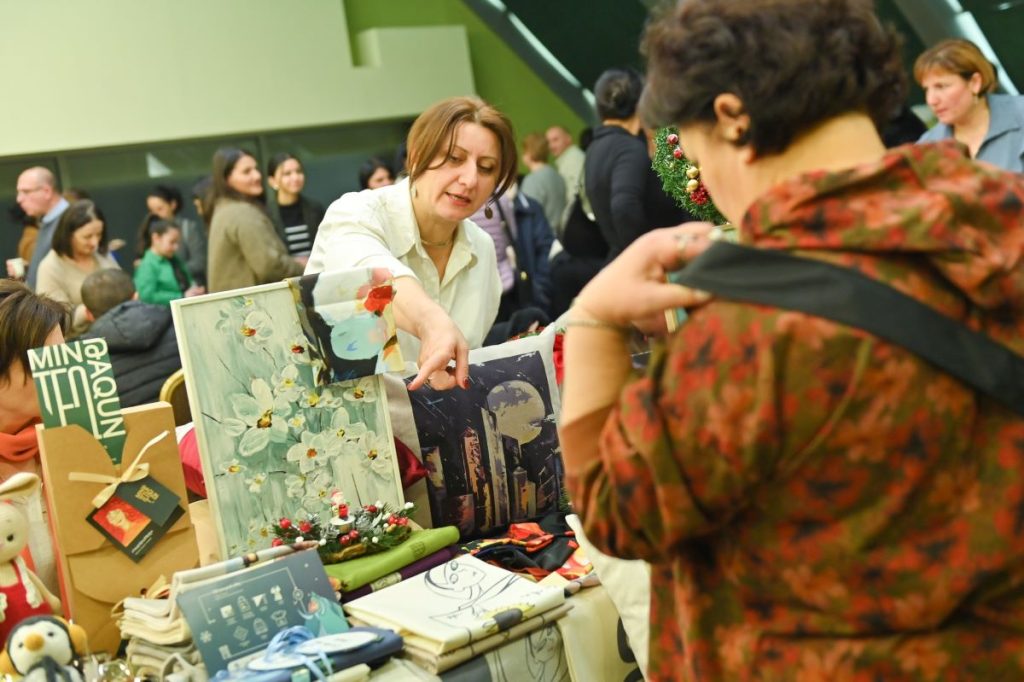
In 2022, Srbuhi founded the brand “Min takun teh” (translated as a secret place). It offers customers tablecloths, pillowcases, pillows, bags, T-shirts, sweatshirts with original drawings and inscriptions in the Karabakh dialect.
“The brand worked under blockade conditions, I used everything I had. Where it was not possible to print on fabric, I drew by hand,” she says.
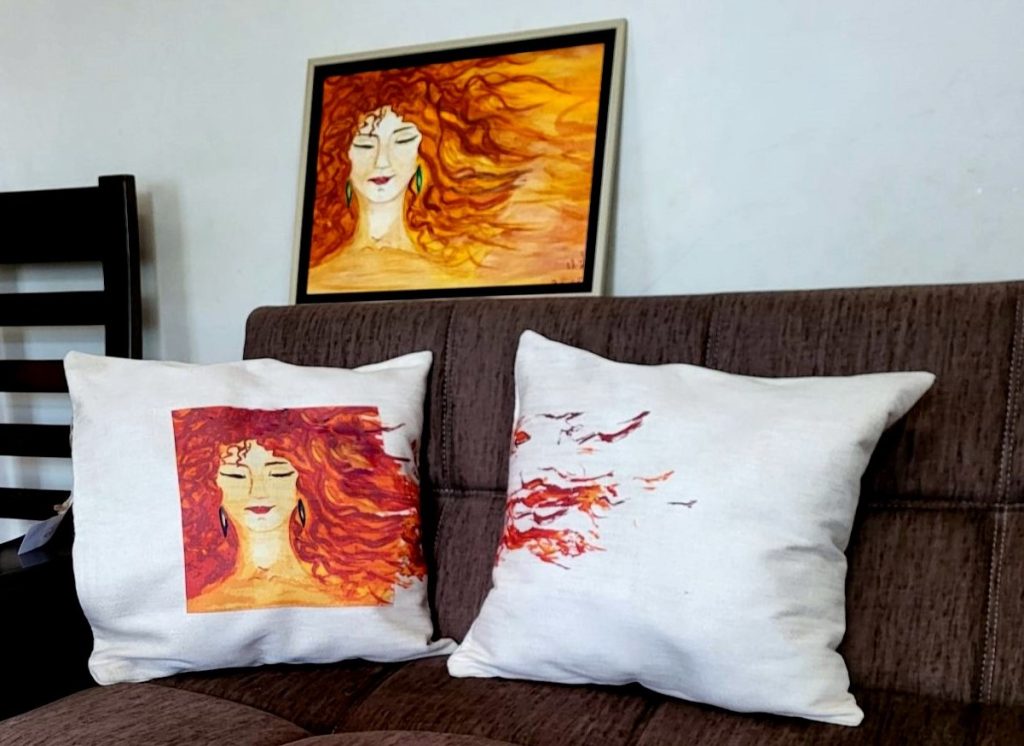
Now she is preparing to resume work in Armenia. She is studying the market to understand how best to prove her product:
“For now, everything will remain the same except the brand address. We will just start with a new page. This is a new market for us, different rules of the game. Artsakh was a small society, everyone knew each other. Often they bought goods knowing you. Now we have to integrate into the new market.”
Srbuhi is determined to succeed. A few days before the war, she received another grant from the All-Armenian Benevolent Union (AGBU):
“I decided then to buy an embroidery machine. Now we will have to take a step back and buy the necessary equipment. We will try to keep our brand with our own flavor. It was easy there. Now it is more difficult, now we are in a different environment. But we have to demonstrate our culture, our identity in our work.
We’ll work hard, we’ll overcome everything
This is not the first time the Harutyunyan family has been forced to leave their home. They came from Shusha. After the war in 2020, they were forced to move to the capital. And after the one-day war in September, like all the residents of NK, they moved to Armenia. Now they live in Dilijan.
“We rent a two-room apartment, we live here with all of us. One day we went to Lake Parz with our children. The children suddenly say they are hungry. And my husband, Mher, asks me: “Why don’t we open a bakery here? We’ll bake zhingyalov hats. I think we’ll do well.” In the evening we discussed the idea at home. In the morning, Mher rented the premises and started working the next day,” Gayane Harutyunyan says.
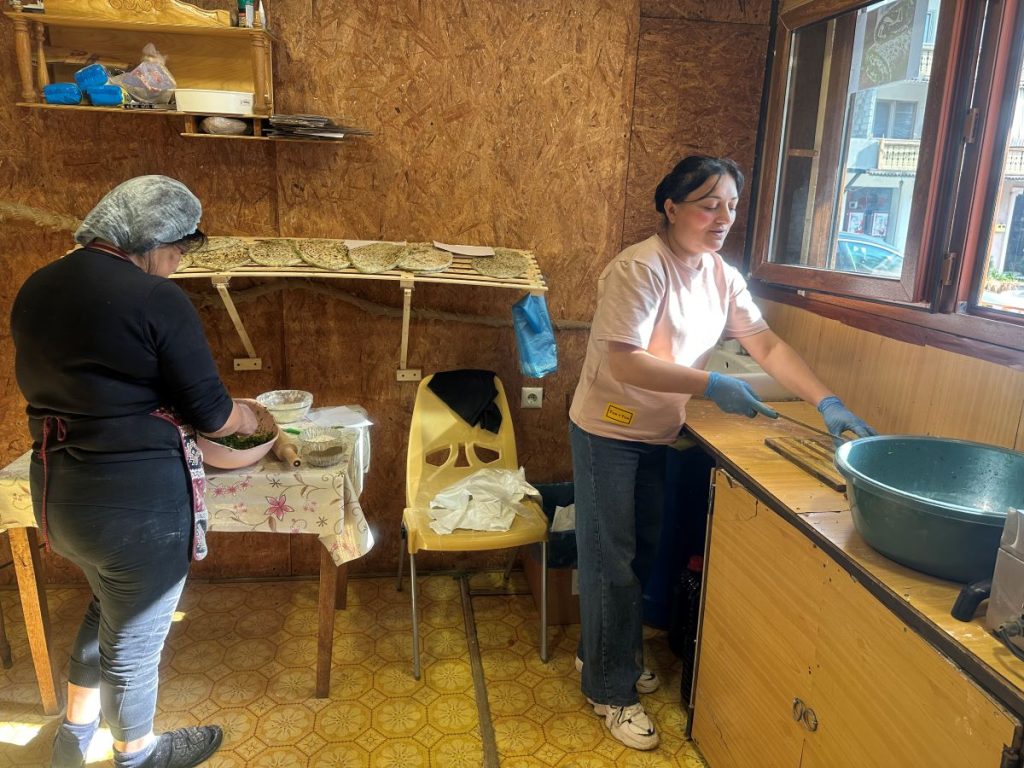
She remembered clearly: on the first day they earned 35,000 drams [about $87.5], on the second day 47,000 [about $117.5], and on the following days 70,000 [about $175] each.
“We had only been working for two weeks and already the whole town knew about our bakery. We buy herbs, flour, oil, we pay 80,000 drams [about $20] for the premises, 200,000 [about $500] for the apartment. We have to work to pay for everything,” Gayane says.
For 18 years she worked at the Shusha children’s and youth sports school, and after the war in 2020 she started teaching at Grigor Narekatsi University in the capital.
She says her mother also raised her, her sister and brothers by baking flatbread with herbs:
“My father died early. My mother raised us alone, but all four of us got higher education. And it is not easy for us now, but we will work for the sake of our children, we will overcome everything.”
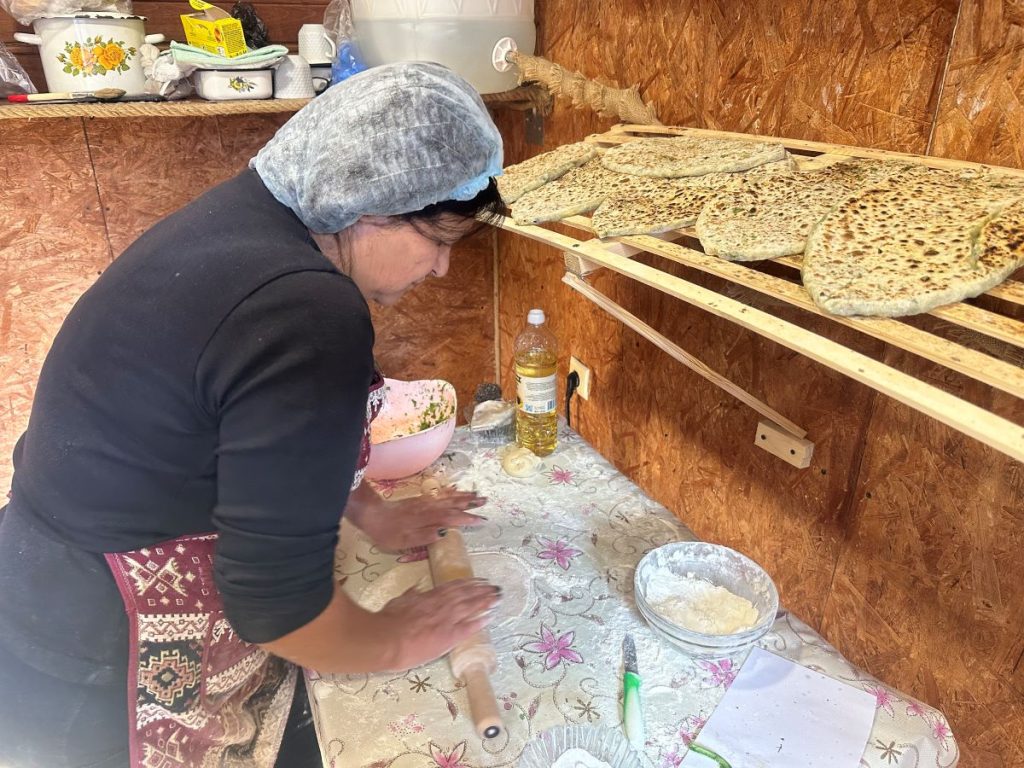
Follow us – Twitter | Facebook | Instagram
NK residents in business










